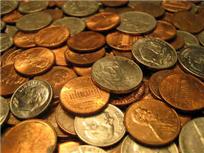 Many state political and business leaders are clamoring to do away with Oklahoma’s personal income tax, the state’s single largest revenue source, while acknowledging the need to maintain sufficient tax revenue to fund basic services. One influential participant in the tax debate, House Revenue and Taxation Committee chairman David Dank, has made clear that he would support raising the state sales tax in order to eliminate the income tax. Rep. Dank was quoted in February saying:
Many state political and business leaders are clamoring to do away with Oklahoma’s personal income tax, the state’s single largest revenue source, while acknowledging the need to maintain sufficient tax revenue to fund basic services. One influential participant in the tax debate, House Revenue and Taxation Committee chairman David Dank, has made clear that he would support raising the state sales tax in order to eliminate the income tax. Rep. Dank was quoted in February saying:
My personal preference would be to eliminate the state personal income tax entirely and replace it with consumption taxes on items other than groceries and prescription drugs, where everyone pays a fair share based on what they buy. The more money people have, the more they spend.
In Rep. Dank’s view, eliminating the income tax will draw businesses and investors who will otherwise choose a state without an income tax, such as Texas. However, if the point of tax reform is to boost Oklahoma’s economy, our leaders should be wary of raising the state sales tax. Scrapping the income tax in favor of higher sales taxes would do many things, but none will be good for our economy. Here are just a few ways that a higher sales tax will hurt our state:
1. Excessively taxing sales will harm the economy.
The nation’s economy is driven to a great extent by the sale of goods to consumers and increasing sale taxes will mean most Oklahomans can buy less with their money. What they might gain from not paying income tax they will turn around and pay in higher sales taxes. The most recent figures show personal consumption expenditures in the United States accounting for 71 percent of total Gross Domestic Production (GDP). When consumption drops due to increasing sales taxes, many businesses will have to cut back on hiring and salary increases to stay afloat, sending a ripple effect through the economy.
2. Oklahoma’s sales tax is already high.
Oklahoma’s combined state and local sales tax rate (based on calculating the average local sales tax) is 8.66 percent, the 5th highest rate in the nation — and higher than any of our neighboring states — according to a new Tax Foundation report . In addition to the 4.5 percent states sales tax rate, cities may levy sales taxes between 1 and 5 percent and counties may add sales taxes of up to 2 percent (you can see local sales tax rates for Oklahoma cities and counties here – the highest total rate is in Fort Gibson at 11 percent). If the state raises the sales tax an additional one percent, Oklahoma’s combined sales tax rate would be the highest in the nation.
3. Raising the state sales tax even higher would hurt local businesses.
A high sales tax harms Oklahoma business’ ability to compete with rival businesses across the state line and with online competitors who often don’t collect sales tax at all. After all, most people wouldn’t move their family to Texas to avoid the income tax, but some people will drive to Kansas or shop on the Internet to avoid a sales tax. Untaxed Internet sales are costing our state and local governments $185 to $225 million in lost revenue annually, according to the Oklahoma Tax Commission. While Oklahoma cannot and should not prevent its residents from shopping online, we should be very careful about raising the incentives to purchase online by raising the cost of the clothes, electronic goods, or hardware bought at our local Main Street businesses.
4. Consumption taxes are no more voluntary than the income tax.
Rep. Dank has also justified the sales tax based on the idea that people can have more control over their liability by saving rather than spending. In a recent interview with Tulsa’s public radio station, Dank stated:
You can be fair and do a consumption-based tax, because that’s a tax people can actually control. They can determine, except for their basic needs like groceries and prescription drugs and those types of basic needs, they can pretty much control what they buy and what they don’t buy, what they purchase and what they don’t.
However, taxpayers can already control their tax liability under the income tax by, for example, saving income in tax-deferred vehicles like 401(k)s and 529 college savings plans. Besides, under both taxes, taxpayer control depends on having excess income. Oklahoma is a high-poverty state, so many families have little choice at all to purchase beyond their basic needs.
5. A higher sales tax will hurt average people hardest
Increased sales taxes will also hit low- and moderate-income households hardest while allowing the wealthy to pay less We need to maintain a balanced tax system where everyone contributes to the future of our state; increasing our already-heavy reliance on sales taxes would be a major step backwards.
The bottom line is that in these challenging times, when local businesses are fighting to keep their doors open and families are struggling to pay their bills, discouraging customers from spending their money on local businesses is not the right approach to strengthen Oklahoma’s economy.





 OKPOLICY.ORG
OKPOLICY.ORG




Sales tax should not be increased, but property taxes should, at least for land not used for business. Also, we should close the loophole on Internet sales tax and direct the money to eliminating income tax. It is tax neutral and encourages local buying, while encouraging the building of wealth in our state.